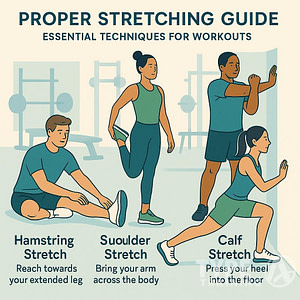Quality sleep is a crucial pillar in enhancing your athletic performance. Whether you are an elite athlete or a recreational sports enthusiast, sleep significantly influences your physical recovery, endurance, and overall performance.
Adequate sleep enables the body to repair and build muscle, regulate metabolism, and maintain optimal cognitive function. All of these are essential for peak athletic performance.
Your well-being and health can be deeply affected by your sleep habits. When you consistently get sufficient rest, you reduce your risk of injury and enhance your ability to perform at higher intensities.
Popular posts:
Athletes often require more sleep than non-athletes to effectively manage the stress and recovery balance needed for consistent performance improvements.
Understanding how sleep impacts your mental and physical state can provide a competitive edge. Lack of sleep not only affects your physical capacity but also heightens irritability and anxiety levels, jeopardizing your mental health.
A systematic review of sleep interventions emphasizes the importance of interventions aimed at improving sleep to amplify athletic performance. Adjusting your sleep habits can be the simplest yet most effective strategy for achieving your athletic goals.
The Importance of Sleep for Athletes
Sleep plays a critical role in enhancing athletic performance by supporting physical recovery and reducing injury risk. Proper sleep can significantly impact your endurance, training adaptations, and overall health.
Impact of Sleep on Physical Performance
Adequate sleep is essential for optimizing your physical performance. A good night’s rest can improve reaction times, speed, and accuracy, which are crucial in many sports.
Studies have shown that athletes with sufficient sleep perform better during competitions and training sessions. Sleep also enhances muscle recovery, helping you regain strength more effectively after intense workouts.
Enhanced sleep duration has been linked to improved performance metrics, which can result in competitive success.
Sleep and Recovery: Essential for Training Adaptations
Recovery is a vital aspect of athletic training, and sleep acts as a natural recovery modality. Your body undergoes essential processes during sleep, such as muscle repair and growth, making it an optimal time for your muscles to adapt to training stress.
Elite athletes often require longer sleep periods to reach peak performance levels. Consistent sleep patterns enhance your body’s ability to adapt to varied training loads, leading to better recovery and improved overall athletic performance.
Role of Sleep in Injury Prevention and Health Maintenance
Sleep quality is closely linked to injury risk and health maintenance. Poor sleep can result in increased irritability and a higher risk of injuries due to impaired motor skills and judgment.
Ensuring you get enough sleep can help maintain your mental and physical health, reducing the likelihood of injuries and illnesses.
Consistently achieving quality sleep also plays a role in maintaining optimal health parameters, such as reduced risk for hypertension and stress-related conditions. Proper sleep helps sustain long-term participation in sports, reducing disruptions from injury or health issues.
Effects of Sleep Deprivation on Athletes
Sleep plays a pivotal role in maintaining optimal athletic performance. Lack of adequate sleep can severely impact cognitive abilities, muscular recovery, and mental health, which are crucial for athletes to perform at their best. Understanding these effects can help manage risks and improve overall performance.
Cognitive and Reaction Time Impairments
Sleep deprivation negatively impacts your cognitive performance and reaction time. Athletes rely on quick decision-making and fast reflexes during competitions, and inadequate sleep can lead to slower reactions and poorer judgment.
Fatigue from sleep loss affects attention span and memory, increasing the likelihood of errors. Studies found that restricted sleep can make athletes more prone to mistakes, resulting in missed opportunities and potential injuries.
Sleep Deprivation and Muscular Recovery
Adequate sleep is essential for muscle recovery and repair. Sleep deprivation can impair your body’s ability to recover from intense training sessions, leading to muscle damage and decreased endurance.
Lack of sleep affects hormonal balance, particularly growth hormone levels, crucial for muscle repair. This imbalance can slow down your recovery and increase the risk of long-term muscular injuries, making it harder to achieve peak physical performance.
Mental Health Concerns Associated with Poor Sleep
Poor sleep quality can significantly affect your mental health. Sleep deprivation is linked to increased stress levels and emotional instability, impacting your psychological well-being.
Athletes experiencing sleep issues are at higher risk for anxiety and depression. In severe cases, continuous lack of sleep may exacerbate mental health issues, potentially affecting performance consistency and leading to long-term health concerns if not managed properly.
Optimizing Sleep for Enhanced Athletic Performance
To enhance athletic performance, you can optimize your sleep by focusing on both quality and duration. Utilizing strategies such as sleep extension, napping, and maintaining proper sleep hygiene can significantly improve physical recovery and endurance.
Strategies for Sleep Extension and Quality Improvement
Improving sleep for athletes often involves both sleep extension and enhancing sleep quality.
To extend sleep, aim to increase your nightly rest by 30 to 60 minutes. This can enhance recovery, reduce injury risk, and improve performance metrics like speed and endurance.
Incorporate consistent sleep schedules and limit caffeine and electronic device use before bedtime. These changes affect sleep architecture and help in achieving deeper, more restorative sleep phases.
Using sleep interventions such as sleep education tools provides additional benefits to your sleep strategy.
Napping as a Tool for Performance and Recovery
Napping is a valuable tool for athletes aiming to boost performance and recovery. Short naps, typically lasting 20-30 minutes, can effectively improve alertness, reduce fatigue, and provide cognitive benefits.
These mid-day naps supplement nightly sleep and are helpful in maintaining optimal performance, especially during periods of sleep deprivation or increased training loads.
Structuring your nap environment to be quiet and dark further optimizes the effectiveness of these naps. Ensure naps do not disrupt your nighttime sleep to maintain consistent sleep health and endurance levels.
Importance of Sleep Hygiene and Environment
Sleep hygiene plays a crucial role in optimizing sleep quality for athletes.
Focus on creating a sleep-conducive environment that includes comfortable bedding, a dark room, and a cool temperature. Reduce noise with earplugs or white noise machines, and minimize light exposure from electronic devices at least an hour prior to bedtime.
Incorporate relaxation techniques, such as deep breathing or meditation, as part of your bedtime routine to further enhance sleep readiness. By prioritizing sleep hygiene, you establish habits that lead to better overall sleep health, which is directly linked to improved athletic performance.
Specific Challenges and Solutions in Athletic Sleep Patterns
Athletes face unique challenges in maintaining optimal sleep patterns, often impacting their performance and recovery. Frequent travel disrupts circadian rhythms, while sleep disorders can further hinder rest. Nutrition plays a critical role in bolstering sleep and enhancing recovery.
Adapting to Travel and Jet Lag Management
Travel often disrupts sleep due to changes in time zones, causing jet lag. Managing these disruptions is crucial for maintaining performance levels.
To combat jet lag, consider methods like adjusting your sleep schedule before departure and using exposure to natural light to reset your circadian rhythms. Engage in short naps and stay hydrated to minimize fatigue.
Melatonin supplements may also be beneficial in regulating your sleep-wake cycles during travel. Careful planning regarding flight times and maintaining consistent sleep environments can further ease the transition.
Incorporate relaxation techniques, like deep breathing or meditation, to ensure quality rest.
Addressing Sleep Disorders in Athletes
Athletes often encounter various sleep disorders like insomnia or sleep apnea, impacting recovery and performance.
Obstructive sleep apnea may cause interrupted breathing during sleep, leading to fragmented rest. Consult a healthcare professional for personalized strategies, such as CPAP therapy or lifestyle changes, to manage these conditions effectively.
Insomnia, another common issue, can be addressed through a structured bedtime routine. Maintaining a consistent sleep schedule and creating a calming pre-sleep environment are essential practices. Reducing caffeine and electronic device use before bed can also enhance sleep quality.
Nutrition’s Role in Sleep and Recovery
Your nutrition significantly influences sleep patterns and recovery, affecting factors like glucose metabolism and appetite.
Consuming a balanced diet with adequate protein, healthy fats, and complex carbohydrates can promote better sleep. Avoid heavy meals and stimulants close to bedtime to prevent sleep disruption.
Including sleep-promoting foods like cherries and nuts, rich in melatonin, can further enhance your rest. Hydration is equally important, so ensure an adequate intake of water throughout the day.
Monitoring micronutrient intake, such as magnesium and calcium, may also aid in improving sleep quality. Optimize meal timing to align with your body’s natural rhythms for enhanced recovery and performance.
Monitoring and Quantifying Sleep in Sports
Monitoring sleep in athletes has become crucial for optimizing performance and recovery. By evaluating various tools and techniques, you can better understand how sleep affects training load and athletic outcomes.
Technological Advances in Sleep Monitoring
With advancements in technology, sleep monitoring has evolved significantly.
Devices like wearable monitors and smartphone apps offer real-time data on sleep patterns, duration, and quality.
These tools allow you to track sleep stages and disruptions with precision.
Wearables often incorporate heart rate variability and movement sensors to provide insights into sleep health and metabolism.
This technology has gained traction among professional leagues such as the National Football League, aiding athletes in fine-tuning their recovery strategies.
Role of Actigraphy and Sleep Diaries in Athlete Sleep Studies
Actigraphy is an accessible, non-invasive method for tracking sleep-wake patterns over time.
It measures movement, providing data on sleep duration and disturbances.
Used alongside sleep diaries, actigraphy helps capture subjective experiences, offering a comprehensive view of sleep quality.
Understanding these metrics ensures you are aware of issues like sleep debt and its potential impact on both collegiate athletes and professionals.
Incorporating tools like the Pittsburgh Sleep Quality Index can further enhance your assessment of overall sleep health.
Leveraging Sleep Data for Training Load Adjustments
The collection of sleep data allows for informed adjustments to training load.
By recognizing patterns in sleep and recovery, you can tailor training responses effectively.
For instance, tracking sleep debt and recovery cycles enables targeted interventions to enhance endurance and performance.
Implementing sleep interventions based on data can optimize results, helping athletes meet performance goals while minimizing risks.
Using this information not only helps in fine-tuning training regimens but also in promoting long-term health and minimizing injury risks.
Practical Recovery Strategies Beyond Sleep
Enhancing athletic recovery involves integrating various strategies to maximize physical and mental well-being.
While sleep is crucial, combining it with additional recovery modalities and psychological approaches can further support optimal performance.
Combining Sleep with Other Recovery Modalities
Incorporating different recovery strategies alongside sleep can enhance recuperation.
For instance, cold water immersion is known to reduce muscle inflammation and soreness, offering a quick turnaround from intense training sessions.
Compression garments help improve circulation, which aids in reducing muscle fatigue and speeding up recovery.
A balanced routine might include a mix of adequate sleep, alongside these methods, tailored to your specific training needs.
Hydration and nutrition are also key components; consuming proteins and electrolytes can supplement your recovery by repairing muscle tissue and maintaining energy levels.
Psychological Approaches: Mindfulness and Stress Management
Addressing mental well-being is equally important when considering recovery strategies.
Practices such as mindfulness meditation offer significant benefits by enhancing cognition and reducing stress.
This, in turn, allows for better focus and relaxation during both training and rest periods.
Stress management techniques like deep breathing exercises can also be valuable.
They not only help in calming the mind but play a role in effective recovery from training by allowing your body to reset after physical exertion.
By prioritizing these practices, you support both your mental and physical health, creating a holistic approach to athletic recovery.
Concluding Perspectives on Sleep in Sport
Sleep significantly enhances physical recovery and endurance, playing a vital role in the overall performance and well-being of athletes.
Incorporating Sleep Strategies into Team Cultures
Emphasizing the importance of sleep, team cultures can adopt practices that prioritize optimal health and performance.
Encouraging consistent sleep routines and incorporating sleep education into training regimens are beneficial.
Implementing screening tools recommended by the American Academy of Sleep Medicine can identify athletes experiencing circadian disruption or poor sleep efficiency.
Teams should consider reducing late-night practices and travel-related disruptions to optimize recovery.
Providing resources for managing sleep environments can help address individual needs.
Supporting mental health through better sleep contributes to reduced cortisol levels and improved performance.
Future Directions in Sleep Research for Athletics
Research is progressing towards understanding detailed sleep needs for specific sports.
Investigations into individualized sleep interventions continue to be crucial, focusing on monitoring tools that assess and enhance sleep quality.
The International Olympic Committee emphasizes evaluating sleep’s impact on neuromuscular function and athletic performance.
Exploration into the links between sleep efficiency and long-term health can guide future policies.
Collaboration with sleep scientists to improve screening techniques will be vital.
Adaptation of proven methods into diverse athletic settings offers promising avenues for enhancing athlete resilience and success in competitive environments.
Frequently Asked Questions
Quality sleep plays a crucial role in muscle recovery, aiding endurance, and refining cognitive abilities during athletic performance.
What impact does sleep quality have on muscle recovery for athletes?
Sleep quality significantly influences muscle recovery.
During sleep, your body engages in processes such as protein synthesis and hormone release, which are essential for muscle repair and growth.
Lack of restful sleep could hinder these processes, slowing down recovery and reducing overall performance.
Can extended sleep improve endurance in sports activities?
Extended sleep can enhance endurance in athletes by providing extra time for physical recovery and mental rejuvenation.
When you consistently achieve more sleep, it helps in energy replenishment, which is vital for prolonged athletic activities, potentially leading to improvement in stamina and overall endurance.
What are the primary findings from studies on sleep and athletic performance?
Research indicates that increasing sleep duration, such as through naps or nighttime rest, may benefit both physical and cognitive performance.
Athletes who habitually sleep around seven hours each night could gain from sleep extension programs that add an extra 46-113 minutes, as noted in this study.
Why might athletes require more sleep than non-athletes for optimal performance?
Athletes may need more sleep than non-athletes due to physical demands and intense training.
The extra sleep aids in faster recovery, energy restoration, and stress management, which are crucial factors for optimizing performance.
The strain from regular training regimens necessitates increased rest to maintain peak physical and mental condition.
How does insufficient sleep affect an athlete’s cognitive and physical abilities during competition?
Insufficient sleep can impair cognitive functions such as focus, reaction times, and decision-making.
Physically, it heightens the risk of injuries and reduces endurance and strength.
Sleep deprivation may also worsen mood and increase both anxiety and irritability, potentially impacting performance negatively during competitions.
What strategies can athletes employ to enhance sleep for better performance and recovery?
To improve sleep, athletes can establish a regular sleep schedule. They can also create a calming bedtime routine and maintain a sleep-conducive environment. Techniques like reducing screen time before bed and ensuring proper nutrition can also contribute to better sleep quality.
Implementing these methods can optimize recovery and performance.













